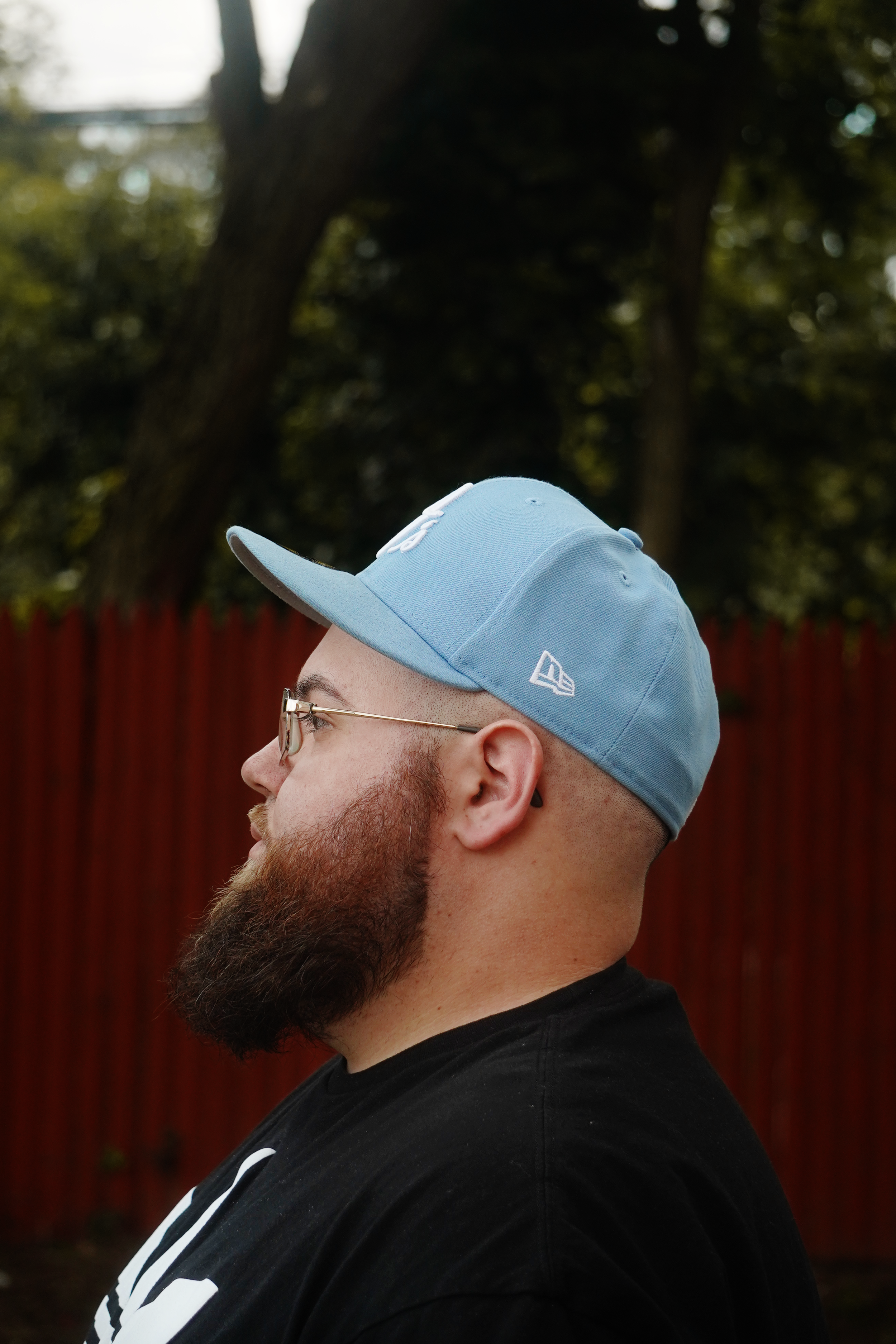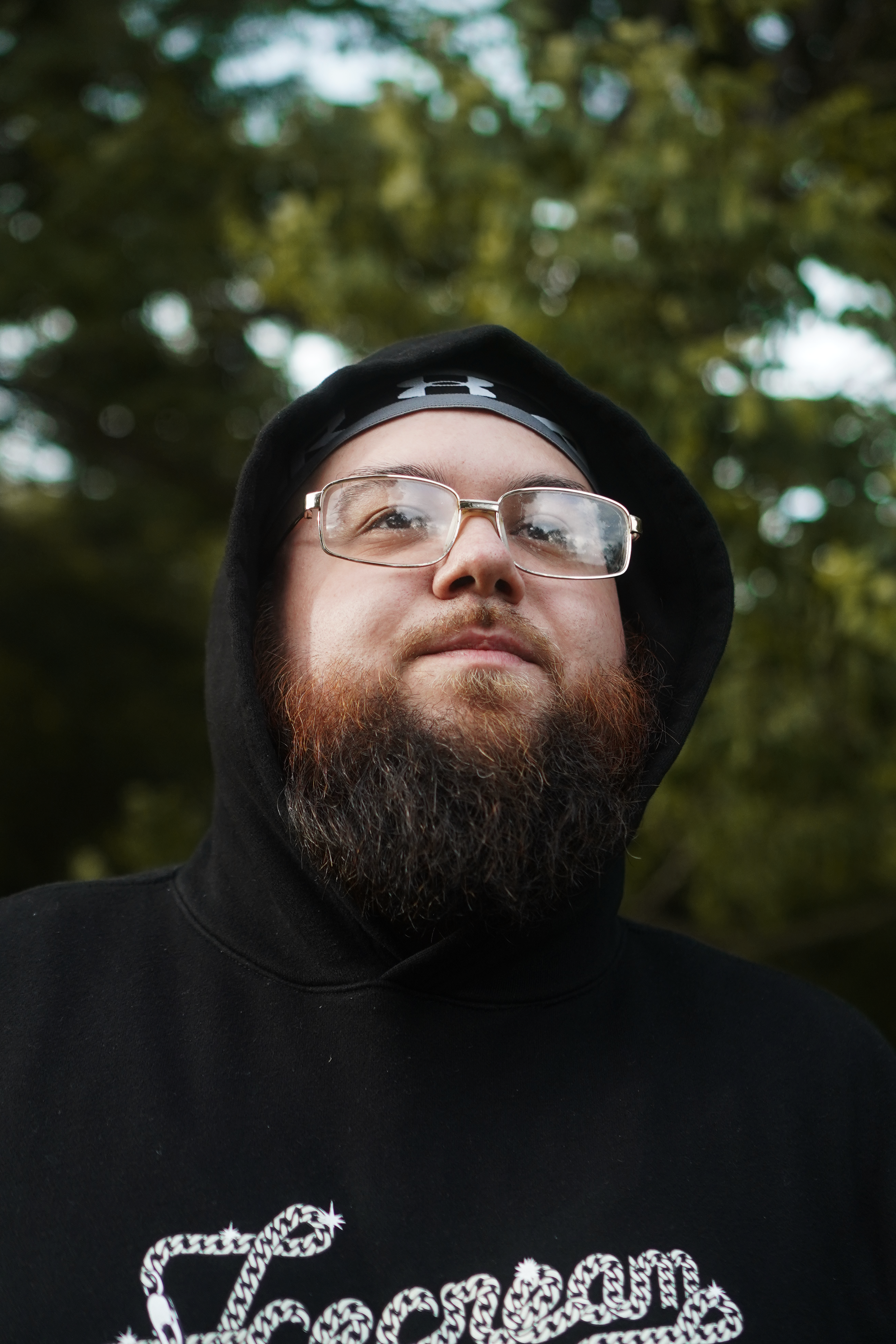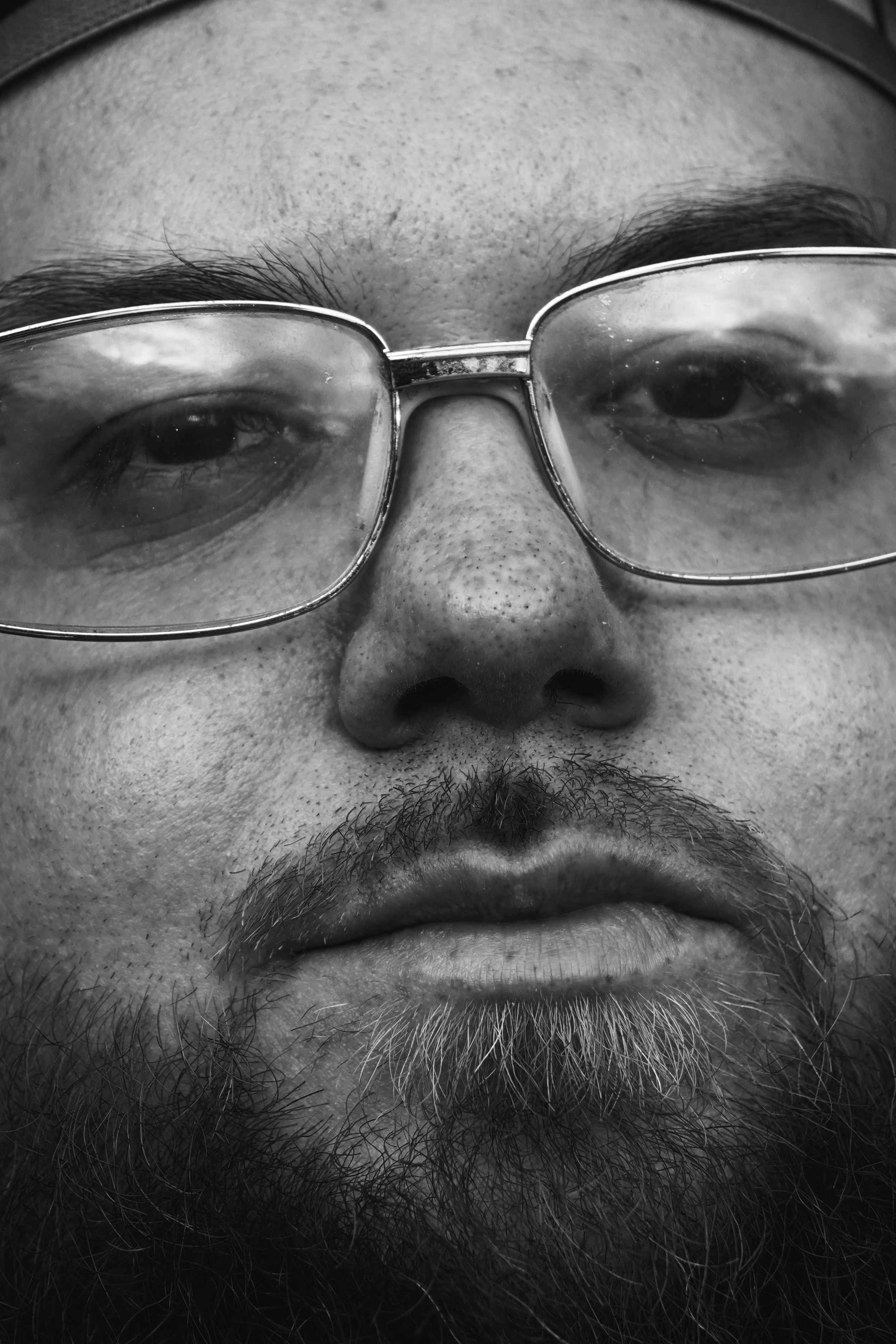Life Is Hard, So John Wells Tells It Like It Is
photography by JEREMY COLLINS, interview by KAYLA CALVIN.
John Wells has gained notable attention as a recording artist and lyricist. Hailing from Baltimore, where musical and poetic talent exists abundantly throughout the city’s cultural past and present, it may be no mistake that Wells is just the latest Baltimorean to exemplify an exceptional skill for poetic storytelling. Furthermore, his most recent drops, Can we link before the world ends? and Life is hard, can we do it together? reflect his motif to speak the raw truth to his environment, personal life experiences, and the state of the world.
When asked about his background in writing and the inspiration he pulls from, he said that he had been writing from a young age, “I used to write my own stories for my grandfather, just about anything. More recently, I’ve been reading a lot of poetry.” With years under his belt as a seasoned writer, his implementation of rhyme scheme, multivocal narration, and symbolism shine through his music. “When I was making these EPs – first of all, I've been getting heavy into poetry and shit too… so I was writing a poem basically about what all of these songs have in common. And I was thinking about actually recording the poem and putting it on the projects, but I was like, no, I'm gonna keep that to myself for real. I've been titling [the EPs] after the poem I wrote.” On the topic of his writing process, he simply said, “I’m always writing, I tend to write in the car the most.” “I’ve perfected writing in the car for real,” he jokes. “But I’m learning to flex that muscle a little more. That’s what these drops were, for real. They’re part of a series to keep me intentional [in my craft.]”
Though these two EP’s may just be a form of staying disciplined for Wells, they speak to a time of reflection on the state of our world. In his first of his two EPs, Can we link before the world ends?, there is a constant struggle present in his words as he details the challenges of unhealthy cycles in both his own life and the people around him, as well as the fear of an untimely death. Sonically, his style of production coalesces beautifully with his vocals, from the rare vinyl sampling on “Healthy conversations” to lo-fi, melodic instrumentals on “Sun in my eye”. The warmth that John instills in his productions is juxtaposed with his emotional and brash lyricism, presenting a sort of strange beauty that comes with his raw pain.
In the song “I think God coming”, Wells contends with the various injustices, wars, and genocides occurring at this moment. He writes “It’s the weight of the world, and the way it’s been curling, October been getting warm, the toll that it takes on a person, I’m anxious and nervous and frankly you should be alarmed, it feel like a bomb is about to go off.” Wells’ words illustrate the tense uncertainty of a peaceful future on Earth as we continue to witness regular bombings and destruction of innocent life by fascist regimes whose immoderate and illegal military campaigns largely contribute to the worsening global warming crisis we face today.
On the topic of how important it is that his music reflects the times just as much as it reflects his life, John tells us “ I feel the need to speak up, but like I said, it's not like me doing it is necessarily saving people, but it's contributing to the overall awareness of letting people know what's going on.. making people aware, [I] feel like it's necessary because then hopefully something could change… it’s just my reality to say what is in my mind. To be intentional about what I have to say, it matters.” This intention is ever-present on Wells’ second EP of the series, Life is hard, can we do it together?. With his longtime partner gracing the cover art, Wells said part of being intentional about his writing includes her. On track 2 “If the world explodes”, we hear, “Feel like imma see the world explode, I don’t care long as you wit’ me.” Wells exclaims that this whole EP speaks to his realization upon reflecting on his life and the world, that “this is the person [he] wants to do life with”. With this realization came another realization, in a world where black women are at the intersection of oppression, John understands and takes on the plight with her. “I just want motherfuckers to know where I stand about all this shit, because I'm not about to just stand next to a bunch of motherfuckers who don't care about the people I love and people that are fucking oppressed right now and oppressed historically…I gotta make sure shit is good wherever we [are] going… there’s imminent danger for real.”
John has no problem confronting these dynamics as a white man whose circle is largely composed of black faces, including the woman he loves. This responsibility is something that the Baltimore rapper also carries with him while navigating the music industry. “ I feel as a white person in a black space, I hate when I see white people that are in these black spaces and they're like fucking damn near Republicans,” Wells continues. “ It's like I'm sitting here trying to move forward in my career, and I'm wondering, how does this guy feel about my views on things, and how does this guy feel about the people I have around me, like you know what I'm saying? And, 'cause that's the thing about this, like these motherfuckers, they work in the music industry.”
The entertainment industry, particularly in music, faces a significant challenge in safeguarding and supporting artists who openly critique world powers and injustices. The most well-known example is Sinead O’Connor, who was blackballed from the music industry after an infamous SNL taping where she protested against the Catholic Church for its abuses against children. Most recently, in June 2025, the artist Bob Vylan was dropped from his agency UTA, banned from entering the U.S., and reprimanded by the U.K. media for leading a “Death to the IDF” chant at the Glastonbury music festival directed against the Israeli Defense Forces, who are currently carrying out an ethnic cleansing in Gaza. These examples are the ever-present threat that lurks in the industry for artists whose views step out of line with those at the very top. Still, as his raw storytelling suggests, this only bolsters his mission to tell it like it is. “I feel the need to tell people to suck a dick sometimes. Like, I feel it’s more necessary to really say what the fuck is on my mind because whoever I’m working with, they’re going to know ‘oh okay, John is on this’.”
Too often, many artists try to create a narrative of struggle in their songs in an attempt to portray a certain lifestyle that could be considered edgy or misadventured. But since a young age, grief and hardship have followed Wells around all of his life. The rapper carries this pain with him throughout his discography, as well as his motto, “Less Funerals, More Birthdays”. However, this reality cannot be overstated more than in his viral song “No Drugs In Heaven”. This 7-minute deep cut tells the story from the perspective of John's late father. It chronicles his life and various grievances and hardships he faced, including the day he was prescribed the drugs that would ultimately lead to his untimely death. It’s hard to listen to this song without feeling the unbearable weight of John’s father’s experiences, with the understanding that that trauma has now passed on to John himself as well as the rest of his family. It is that trauma that Wells puts forth for the world to see, because for him, it is a cathartic process.
John told NUNAR an anecdote about the toll drugs have taken on his family. After running into two uncles at the dispensary shop on two separate occasions, the experiences showed two sides of what his family has become. On one hand, one uncle, his Dad’s blood brother, was doing well for himself, in spite of his troubled past. They chatted about John’s weed use, which he used at the time to soothe his eczema. “I'm just sitting there like, wow, this would be hilarious if my dad could see this.” The other uncle he ran into was still homeless, struggling with addiction. “My other uncle, this motherfucker, he's like on drugs and shit. And, him and his girl was walking by to catch the bus and all this shit. So yeah, I put that in a song before one time. And I'm just like comparing, damn, like this is my father's brother, [and] this is my father's cousin who he lived with.” “ I talked about [my father’s brother] in No Drugs in Heaven. And just looking at all of it… Wow, I don't know, just the way it all ties together as far as what drugs have done to my family and shit. You know what I'm saying… So anyways, long story short, it is part of grieving, it's a part of dealing with all the bullshit.”
“No Drugs In Heaven” was Wells’ most successful song yet, amassing over 500k plays on Spotify and landing him a feature in Rolling Stone magazine. “ Like people connected with that song so deeply. People told me like, dog, I sent my dad to therapy because of this song.” While many around the world were deeply moved, it did not give him the support of his uncle, who felt the song divulged a part of his life that he’d like to be left in the past. “ He was so deeply offended by this shit… that became like this whole thing, but eventually… he just dropped it.”
While headed to Herring Run Park for the second part of the photo shoot, NUNAR was able to get a listen to the new upcoming project that Luck has ready to go. As we passed the row homes and broken pavements, the songs we heard were keenly nostalgic and profound. John Wells’ lyrical and musical prowess are on full display, on another echelon from his previous works, but still with his expertly curated vinyl samples and warm lo-fi productions. It feels inevitable that this project will draw acclaim the likes of which ‘No Drugs In Heaven’ has garnered, if not more. However, at the time of this interview, there was still uncertainty surrounding the release and whether it would be two EPs or one album, among other possibilities.
Wells is currently navigating finding a new home in the form of a major record label, so this next step is being carefully planned by his camp so that his next swing will be a home run. “ I really don’t know what the fuck is going on for real. But [the project] is really personal. I don't know if it is any more personal than I've ever been…’cause all my music is personal…” says Wells. “I’m getting better, I think… Like it's really fucking good. I was telling my homeboy the other day [that] I love whole world burnin’ down...I would also say it's like not my favorite project I've ever made – but this is.”
Vulnerability is Luck’s way out of the world he grew up in. Still, Wells reflected on his tendency to be very personal in his works. When asked if he’s ever hesitant to say something in his songs, his reply let us know that he quells any hesitancy by telling himself: “ The world has contributed to all this terrible shit that goes on in your life for real… a way to make it right is to make your life better, based on that. You know what I'm saying… I gotta get this all out for real.”








